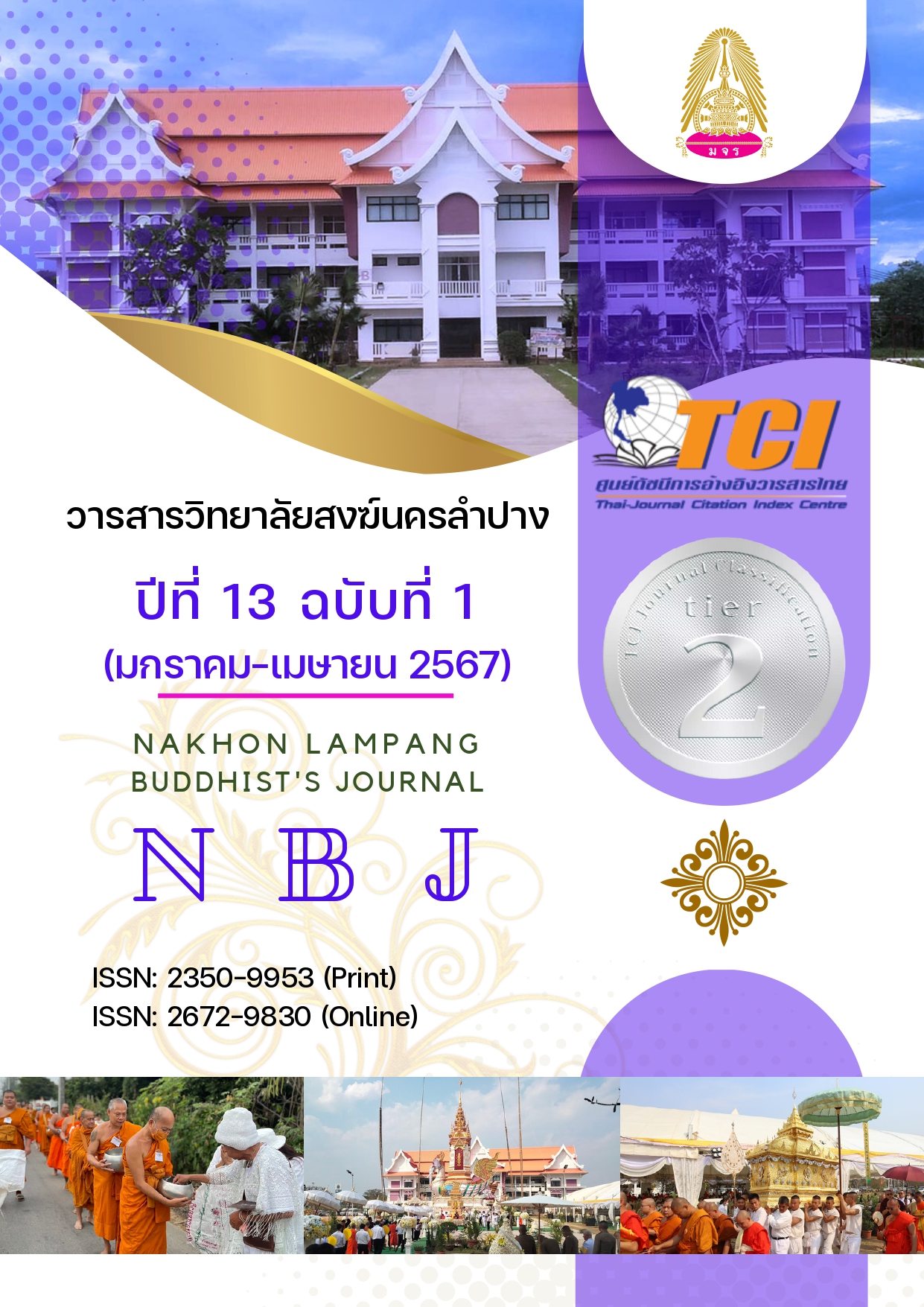การพัฒนาหลักสูตรการสร้างแบบจำลอง โดยใช้การจัดการเรียนรู้ตามแนวคิดสะตีมศึกษา สำหรับนักเรียนชั้นประถมศึกษาปีที่ 5
Main Article Content
บทคัดย่อ
งานวิจัยนี้มีวัตถุประสงค์เพื่อ 1) สร้างและตรวจสอบคุณภาพของหลักสูตรการสร้างแบบจำลองโดยใช้การจัดการเรียนรู้ตามแนวคิดสะตีมศึกษา สำหรับนักเรียนชั้นประถมศึกษาปีที่ 5 และ 2) ศึกษาผลการใช้หลักสูตรการสร้างแบบจำลองโดยใช้การจัดการเรียนรู้ตามแนวคิดสะตีมศึกษา สำหรับนักเรียนชั้นประถมศึกษาปีที่ 5 ซึ่งเป็นการวิจัยเชิงทดลองเบื้องต้น แบบแผนที่ใช้ในการทดลองครั้งนี้ คือ แบบกลุ่มเดียวทดสอบก่อน-หลังการทดลอง กลุ่มตัวอย่าง ได้แก่ นักเรียนชั้นประถมศึกษาปีที่ 5 ภาคเรียนที่ 2 ปีการศึกษา 2566 โรงเรียนชุมชนบ้านจัววิทยา อำเภอสบปราบ จังหวัดลำปาง สำนักงานเขตพื้นที่การศึกษาประถมศึกษาลำปาง เขต 2 จำนวน 22 คน ซึ่งได้มาจากการสุ่มแบบกลุ่ม (Cluster Random Sampling) เครื่องมือที่ใช้ในการวิจัย ได้แก่ หลักสูตร คู่มือการใช้หลักสูตร แบบทดสอบวัดทักษะการสร้างแบบจำลอง สถิติที่ใช้ในการวิเคราะห์ข้อมูล ได้แก่ ค่าเฉลี่ย ส่วนเบี่ยงเบนมาตรฐาน และการทดสอบค่าที (t-test dependent)
ผลการวิจัยพบว่า
1.หลักสูตรการสร้างแบบจำลองโดยใช้การจัดการเรียนรู้ตามแนวคิดสะตีมศึกษาสำหรับนักเรียนชั้นประถมศึกษาปีที่ 5 มี 7 องค์ประกอบ ได้แก่ 1) ความเป็นมาและความสำคัญของหลักสูตร 2) หลักการของหลักสูตร 3) จุดมุ่งหมายของหลักสูตร 4) โครงสร้างเนื้อหาของหลักสูตร ประกอบด้วย 2 หน่วย ได้แก่ หน่วยที่ 1 HUNGER FOOD และหน่วยที่ 2 ท่องโลกอวกาศ 5) กระบวนการจัดกิจกรรมการเรียนรู้ของหลักสูตร 6) สื่อและแหล่งการเรียนรู้ของหลักสูตร และ 7) การวัดและประเมินผลของหลักสูตร ในภาพรวมหลักสูตรมีความเหมาะสมอยู่ในระดับมาก และคู่มือการใช้หลักสูตรในภาพรวมมีความเหมาะสมอยู่ในระดับมาก
2.นักเรียนที่เข้าร่วมการจัดการเรียนรู้ด้วยหลักสูตรการสร้างแบบจำลองโดยใช้การจัดการเรียนรู้ตามแนวคิดสะตีมศึกษาสำหรับนักเรียนชั้นประถมศึกษาปีที่ 5 มีค่าเฉลี่ยทักษะในการสร้างแบบจำลองหลังเรียนสูงกว่าก่อนเรียนอย่างมีนัยสำคัญทางสถิติที่ระดับ .05
Article Details

อนุญาตภายใต้เงื่อนไข Creative Commons Attribution-NonCommercial-NoDerivatives 4.0 International License.
เอกสารอ้างอิง
Buasri, T. (1999). Curriculum Theory: Design and Development. (2nd ed.). Bangkok: The Teachers'council of Thailand.
Buaphan, M., Jaradrawiwat, S., & Jenjit, A. (2020). Effects of Learning Management by Using STEAM on Learning Achievement, Creative Thinking and Attitude of Prathomsuksa 4 Students. Journal of Education Studies, Chulalongkorn University, 48(2), 203-224.
Chanruang, P. (2007). Curriculum Development Principles and Guidelines. LopBuri: Thepsatri Rajabhat University.
Gilbert, J.K. et al. (2000). Science and Education: Notions of Reality, Theory and Model. In Gilbert, J.K. Boulter, C.J., Developing Models in Science Education, pp.20-40. Netherlands: Kluwer Academic Publishers.
Kaewurai, W. (2021). The curriculum development. Phitsanulok: Naresuan University.
Kongchai, I., Vonganusith, V., & Chomnankit, P. (2021). A Training Program Development to Enhance Guide Scouts’Cultural Tourism English Listening and Speaking Skills Based on Context-Based Learning, Collaborative Learning and Scaffolding. Journal of Social Science and Buddhistic Anthropology, 7(6), 270-282.
Khaisaeng, T., Jantakoon, J., & Thamrongsottisakul, W. (2022). The Development of Training Curriculum to Enhance the Ability of Thai Language Teaching Based on Translanguaging Theory for the Teachers of Ethnic Group. Social Sciences Research and Academic Journal, 18(2), 169-183.
Kantiphan, S., & Seethong, P. (2022). The Development of a Curriculum to Enhance Geo-Literacy-Based Geography for Grade 2. SikkhaJournal of Education, 10(2), 177-188.
Neangsin, W., & Sirichaisin, K. (2023). The Development of Curriculum to Promote Chinese Reading using Game Based Learning for Grade 2 Students. EDUCATION JOURNAL Faculty of Education, Nakhon Sawan Rajabhat University, 6(3), 259-270.
Pongern, W. (2017). STEAM, Arts for STEM Education: Improvement in Perception,Capacity and Inspiration for Children. Journal of Education Studies, Chulalongkorn University, 45(1), 320-334.
Poompanich, S., Keawurai, W., Suttirat, C., & Savagpun, P. (2017). The Development of Curriculum to Enhance Learning Design Competence on Coaching and Mentoring for Municipalities Teachers. Journal of Education Naresuan University, 21(1), 261-275.
Patphol, M. (2019). Core Concepts for Curriculum Development. Bangkok: Innovative Leaders Centre of Curriculum and Learning.
Schweingruber, H. A., Keller, T. E., & Quinn, H. R. (2012). A Framework for K-12 science education: practices, crosscutting concepts, and core Ideas K-12. Washington: The National academies Press.
Sankhom, A., & Kongson, R. (2023). The Development of Creativity and Innovation Skills and Attitude Towards Learning Management Based on STEAM Education of High School Students. WESTERN UNIVERSITY RESEARCH JOURNAL of HUMANITIES and SOCIAL SCIENCE, 9(2), 237-250.
Taba, H. (1962). Curriculum Development Theory and Practice. New York: Harcourt, Brace & World, INC.
Tyler, R.W. (1971). Basic Principles of Curriculum and Instruction. (31st ed.). Chicago: The University of Chicago Press.
The Institute for the Promotion of Teaching Science and Technology. (2018). Handbook for Using the Fundamental Science Curriculum for Elementary School Science Learning Group (Revised Edition BE 2560) According to the Basic Education Core Curriculum BE 2551. Bangkok: The Agricultural Cooperative Federation of Thailand., Limited.
Tunprapussorn, K., & Kaewurai, W. (2018). The Development of Curriculum Promoting Quality of Life Aging: Case Study of Muncipal City, Phitsanulok. Journal of Education Naresuan University, 22(2), 74-83.
Toonja, P., & Seethong, P. (2021). The Development of Disaster Preparedness Training Coursed for Mudslidesby Using Dave's Theory of Practice for JuniorHigh School Studentsin Tak. WESTERN UNIVERSITY RESEARCH JOURNAL of HUMANITIES and SOCIAL SCIENCE, 7(1), 143-153.
Tayapong, P., & Seethong, P. (2022). The Development of Curriculum to Enhacescience Process by Using the Expermental Teaching Method for Fifth-Grade Students. Journal of Graduate Studies Review Mahachulalongkornrajavidyalaya University, Phrae Campus, 8(1), 68-82
Uttranant, S. (1989). Fundament and the curriculum development. (3rd ed.). Bangkok: Mitrsiam Printery.
Yakman, G., & Lee, H. (2012). Exploring the exemplary STEAM education in the U.S. asa practical educational framework for Korea. Journal of the Korean Association for Science Education, 32(6), 1072-1087.

